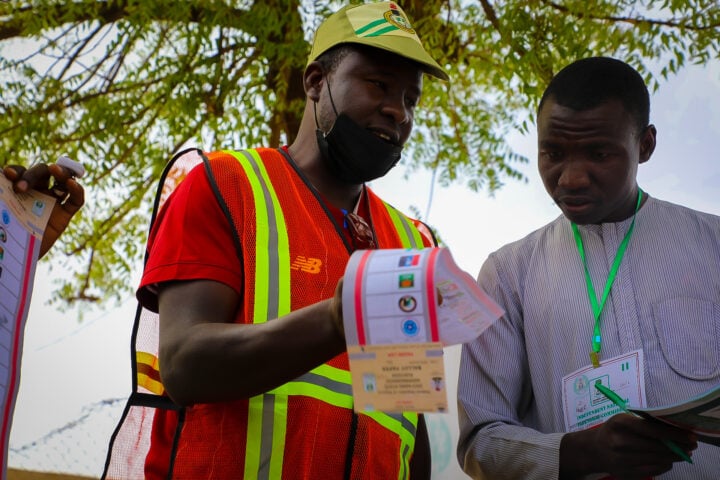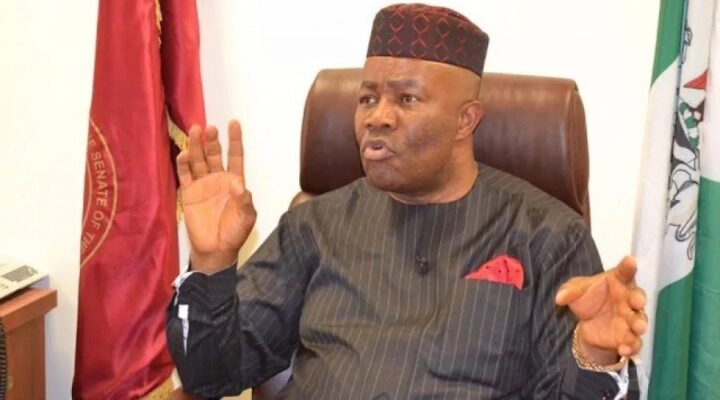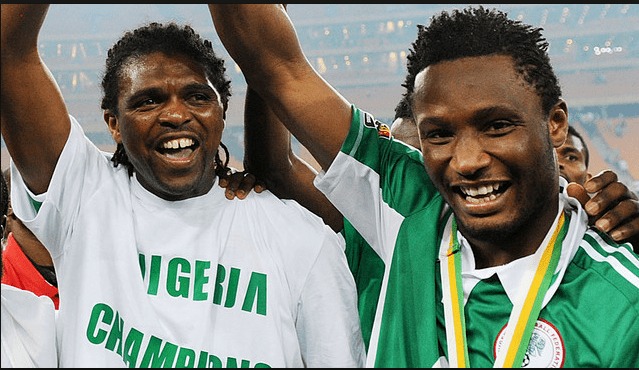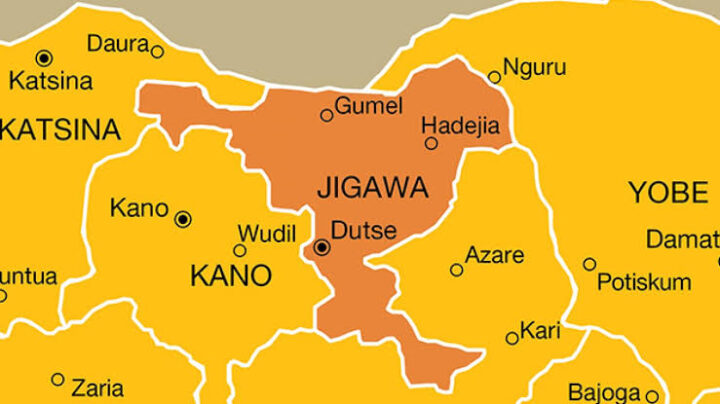On June 27, the European Union Election Observation Mission (EUEOM) in Nigeria presented its final report on the 2023 polls.
Barry Andrews, the chief observer who presented the report in Abuja, said the findings were based on the analysis of compliance with Nigeria’s regional and international commitments for democratic elections.
The report indicted the Independent National Electoral Commission (INEC) for the operational challenges and glitches experienced with the bimodal voter accreditation system (BVAS) and the result viewing portal (IReV).
Since its release, the 92-page report has stirred a myriad of reactions from stakeholders, including the federal government and INEC.
Advertisement
The federal government rejected the report, describing it as a poorly done desk job, saying the EU mission had limited coverage of the elections.
The government said the EU mission premised its findings on rumours, social media commentaries, and statements made by the opposition parties.
On its part, INEC said it was unfair to judge the commission and the entirety of the polls due to a few glitches, maintaining that Nigeria is on course to achieving optimal democracy.
Advertisement
TheCable compiles the major highlights of the EUEOM report:
‘PUBLIC CONFIDENCE AND TRUST SEVERELY DAMAGED’
According to the EU election mission report, the performance and reputation of INEC “improved significantly” after the 2019 elections, owing to the introduction of new technology that gave hope to stakeholders.
However, the report said public confidence and trust in the electoral umpire were “severely damaged” due to lack of transparency and operational failures in the conduct of the February 25 presidential election.
Advertisement
The mission said INEC’s delayed and insufficient explanations for its failures affected the public confidence in the commission.
The report averred that the commission devoted little effort to respond to “other recurrent problems, such as vote buying, which goes hand-in-hand with illegal campaign financing and remains a challenge in Nigerian electoral processes”.
“INEC did not manage to successfully establish its own in-house capacities effectively and continued having weaknesses in its administrative and operational functions. INEC adopted the 2023 election project plan with the specific timelines and activities for the general election,” the report reads.
“The plan was often referred to publicly, however, INEC lacked efficient implementation during critical stages of the electoral process, impacting several schedules, notably the voter registration exercise and the production and distribution of PVCs.
Advertisement
But the mission exonerated the commission on factors that affected logistics for the polls. The report said the electoral umpire faced a “hostile environment” in the organisation of the election, adding that violent attacks on its facilities, naira and petrol shortages, poor infrastructure, and insecurity were serious challenges.
‘FAILURE TO PROMPTLY UPLOAD RESULTS DECREASED PUBLIC CONFIDENCE’
Advertisement
The report said the technology deployed by INEC for the elections was implemented under serious deficiencies of transparency, noting that the software specifications of BVAS, and test results, among others were not made public.
According to the report, the failure of BVAS machine to promptly upload presidential results on the commission’s IReV, decreased public trust and confidence in the process.
Advertisement
“By the time of the declaration of the presidential results, more than a quarter of the presidential result forms were still missing on the portal without a clear public justification,” the report reads.
“By the end of March, there was more than 5 percent of polling unit results still missing without any explanation; 29 results forms about cancelled polling unit results were missing as well.
Advertisement
“IReV performed significantly better during the 18 March election, but still inadequate for a real-time viewing platform.”
‘ELECTION CAMPAIGNS MARRED BY RELIGION, ETHNICITY, USE OF STATE APPARATUS’
In the report, the EU mission team said the election campaign took place in a “competitive, highly charged and complex political environment marked by increased party factionalism and ongoing realignments across party lines”.
The report said some state governors implemented “executive decisions and restrictive actions” to inhibit the campaign environment. How Nyesom Wike, former governor of Rivers state, imposed campaign rules that were “more restrictive than INEC regulations” is cited as an example of such restrictive actions.
According to the findings, campaign rhetoric referenced religion and ethnicity, adding that campaigns took place at worship centres and some religious clerics canvassed support for candidates based on their faith.
EU observers said they “received credible reports of pressure on civil servants by governors, for example through termination of work contracts as an intimidation measure or withholding salaries as a guarantee for delivered results in the campaign”.
“In the aftermath of the presidential elections, the use of religion and ethnicity in the campaign increased and largely shaped the campaign rhetoric in states like Lagos, Nasarawa, and Kaduna,” the report said.
“Ethnic tension was particularly strong in Lagos, where the gubernatorial campaign was dominated by divisive language of ethnic belonging and exclusion.
“The campaign was marred by intra-party conflicts, mostly within the PDP and APC and often related to disputes over zonal representation.
“Both APC and PDP campaigns, including online, used abusive language with mutual personal accusations perceived in the Nigerian context as a form of hate speech.”
The report said the two major political parties — the All Progressives Congress (APC) and the Peoples Democratic Party (PDP) — failed to promote national and religious balance in their presidential tickets.
“At the end of the constitutional two terms limit of President Buhari (Muslim from the north), the presidential elections ensued wide-reaching controversies about zonal representation triggering intra-party disputes as neither the APC Muslim/Muslim ticket nor the PDP Muslim/Christian ticket were seen to adhere to it,” the report stated.
‘74 DEATHS OUT OF 101 CASES OF CAMPAIGN-RELATED VIOLENCE’
During the observation period — 11 January to 11 April 2023 – the mission observed 101 cases of campaign-related violence resulting in 74 fatalities.
The mission said the majority of the violence was related to state-level elections, adding that deployment of politically sponsored thugs to intimate opponents created a “precarious environment”.
The report mentioned that increased numbers of assassination attempts and attacks on candidates contributed to volatile environment in Imo, Rivers, Enugu, Ebonyi, Osun and Cross River states.
While noting that violence declined after the announcement of the presidential election results, the report said the environment remained tense, particularly in the highly contested states of Lagos, Kano and Rivers.
‘MISUSE OF SOCIAL MEDIA TO COORDINATE TARGETED MESSAGES’
The report stated that social media was deployed as a campaign tool for the politicians who contested in the elections.
Peter Obi, the presidential candidate of the Labour Party (LP), is cited as having a strong online engagement in the build-up to the election, owing to his support base, majorly young Nigerians.
The mission observed that among new followers of the four leading presidential candidates on Twitter was a very high rate of either automated accounts (bots) or anonymous suspicious accounts.
“The mission also noted coordinated efforts to influence the campaign, primarily through hashtags, with the involvement of a large number of users.
“Harmful content, allegedly produced by political camps as well as various individuals to gain financial or other benefits, regularly targeted actors across the political spectrum, sometimes including INEC or the mainstream media, contributing to an opaque information environment,” the report said.
The report mentioned Femi Fani-Kayode and Festus Keyamo, who are both APC members, as examples of politicians who published misleading political claims on Twitter in the build-up to the election.
“Femi Fani-Kayode, a former minister of aviation and an APC party member, made a claim on February 11, 2023, that the PDP presidential candidate, Abubakar, had a secret meeting with serving military generals in Abuja. He accused Atiku of wanting to incite chaos, provoke a coup d’état, and establish a new and unconstitutional order,” the report said.
“Kayode posted this claim across multiple social media platforms, and it garnered 281.2k total impressions. The next day, he posted that the army denied reports about a meeting between its officers and Atiku. On 12 February Festus, Keyamo from APC promoted information published by a suspicious website, accusing Peter Obi of bribery. The story quickly become viral and was in a few hours debunked.”
‘VOTER INTIMIDATION, OVERCROWDED COLLATION CENTRES’
The mission said the team observed incidents of voter harassment and intimidation as well as violent attacks on polling units in 21 states.
The report said the “obstruction and organised violence limited the free expression of the will of the voters” during the election.
“In Imo, 19 INEC officials were abducted, resulting in postponed elections. In Kogi, six INEC officials were abducted. Voting also was postponed to 19 March in 10 polling units in Lagos, while various reports from Lagos indicated a much larger scale of disruption of voting,” the report said.
The observers said “chaotic, disorganised, and tense conditions” were experienced at collation centres on election night.
The report added that many collation centres at the ward level did not open at all, particularly in the south-south and south-east zones.






